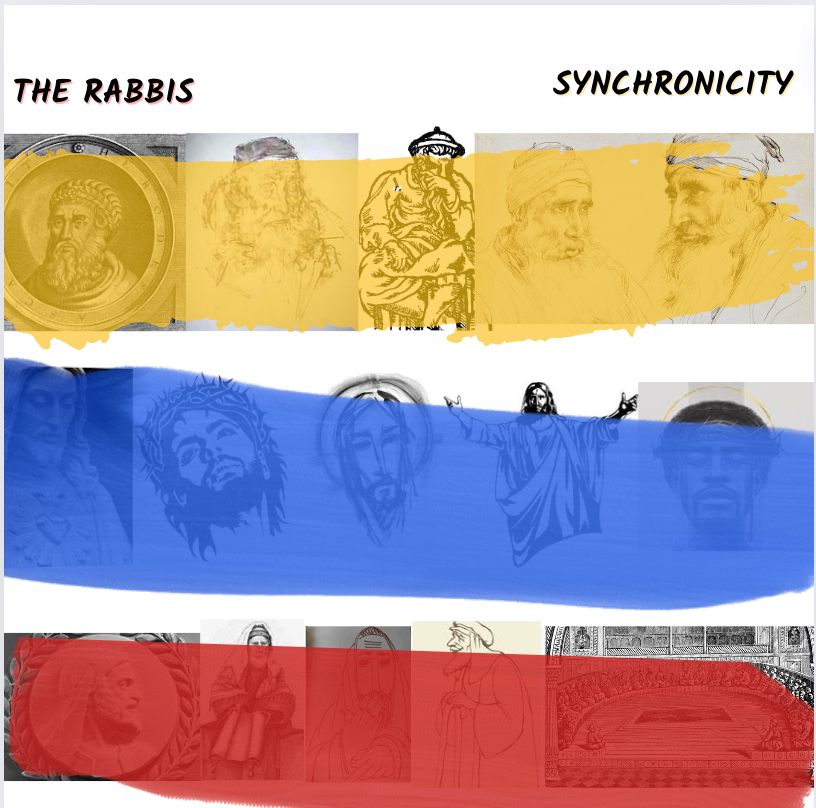Wrapping up Jesus
A sample platter of Gospel x Rabbinics mashups

This is Life as a Sacred Text 🌱, an everybody-celebrating, justice-centered voyage into ancient stories that can illuminate our own lives. It‘s run on a nonprofit, so it’s 100% NAZI FREE. More about the project here, and to subscribe, go here:
We've been spending a while in Jesus Country, but to all things there must come an end. And yet, I do in so many ways feel like we're just getting warmed up. So please indulge me with one last post, with some miscellaneous Jesus and Rabbinics Bits and Bobs.
If you haven't read Part One and Part Two of this series, please do those first, because things will make a lot more sense if you do.

Today we'll be bouncing around. Topic to topic, Gospel to Gospel, all over the place.
You know where we are in the story:
We're reading Jesus as playing in the Pharisaic League, (mostly) on Team Hillel, arguing according to the mutually agreed-upon rules of the game.
Why? Because understanding how the Jews and Judaism may be situated in the Gospels should matter to Jews, and it should matter to Christians, and doing this kind of textual detective work is a great case study for anybody of any kind of background, I gander– in how assumptions can change with new information and context, to say nothing about better understanding one of the major religions trying to pull a theocracy these days.
If, indeed, Jesus is (mostly) Beit Hillel (potentially among other identities or relationships, or not, or whatever) and the Pharisees portrayed in the Gospels are Beit Shammai– so the Gospel stories are really about Jesus and the Pharisees having reasonable conversations about in-group matters, this impacts what the text is, says, means. It changes the very substance of what those conversations were. Now, obviously the Jews' takeaways from this might be different from a range of Christians' takeaways, and from those of other non-Jewish non-Christians (who may have a variety of relationships to these texts, for various reasons). But, let's be clear about this one bit:
At some point– certainly by the time the impacts of the failed Bar Kochba Revolt had landed– Christianity and Judaism became separate religions. And Judaism has evolved and changed significantly since the fall of the Temple and in the, say, 2000 years since then. So no matter where we ultimately position Jesus vis a vis these texts, one should thus not reach the conclusion, "therefore Christians today should co-opt Judaism, or Jewish texts or practices." Nope. That breakup already happened, no matter what Jesus and his buddies were chatting about. Y'all have your own robust set of traditions, teachings and practices, and those are still your own treasure troves and exegetical battles you gotta fight.
BUT it sure changes how one might understand the Jews and their role in the story, eh? One can see how angles were sharpened to make them more antagonists (because Rome certainly couldn't be the problem, Caesar Domitianus Augustus Sir!). And a myriad of takeaways – and new questions– may flow from all these observations.
But let's finish up before we get too far ahead of ourselves.
What else might we see through the lens of this thesis? Was Jesus Beit Hillel, were his interlocutors "the Pharisees," Beit Shammai?
Today! A textual sample platter:
The Resurrection of the Dead! 🧟
As previously mentioned, this was a big hot intra-Jewish point of controversy at the time– and there were a range of legitimate "Jewish" answers. In Mark 12:18, we see some Tzadokim/Sadducees trying to get Jesus in a gotcha on this– because they were not big on resurrection in the slightest.
But! Jesus believes in resurrection like a good Pharisee:
Then the Sadducees, who say there is no resurrection, came to him with a question. “Teacher,” they said, “Moses wrote for us that if a man’s brother dies and leaves a wife but no children, the man must marry the widow and raise up offspring for his brother. Now there were seven brothers. The first one married and died without leaving any children. The second one married the widow, but he also died, leaving no child. It was the same with the third. In fact, none of the seven left any children. Last of all, the woman died too. At the resurrection whose wife will she be, since the seven were married to her?” Jesus replied, “Are you not in error because you do not know the Scriptures or the power of God? When the dead rise, they will neither marry nor be given in marriage; they will be like the angels in heaven. (Mark 12:18-24)
Rabbinic Judaism – the Tanaaim – the Pharisees – Whatever you want to call them all had "Resurrection of the dead" on their best-of albums. Everyone did.
Here's one little snippet of a multi-page run of stuff about the resurrection of the dead:
The school of Rabbi Yishmael taught about resurrection of the dead a fortiori from glass vessels: If concerning glass vessels, which are fashioned by the breath of those of flesh and blood, who blow and form the vessels, and yet if they break they can be repaired, as they can be melted and subsequently blown again, then with regard to those of flesh and blood, whose souls are a product of the breath of the Holy One, Blessed be God, all the more so can God restore them to life. (Talmud Sanhedrin 91a)
Heretics asked Rabban Gamliel: From where is it derived that the Holy One, Blessed be God, revives the dead? Rabban Gamliel said to them that this matter can be proven from [verses from] the Torah, from the Prophets, and from Writings, but they did not accept the proofs from him. (Talmud Sanhedrin 90b)
And the examples keep going and going and goooingggg. In fact, the prayer observing the might of the divine, Who Resurrects the Dead, is still part of the liturgy that we Jews recite three times every single day. Just super-doooper Pharisaic, is all I'm saying. (Whether we engage that language as literal or metaphoric now is a longer conversation.)
Shabbos!! 🕯️ 🕯️
Shabbat, the Sabbath, the seventh day, day of rest. There are many conversations in Rabbinic literature about what qualifies as [various types of] "work" – and thus a prohibited [or discouraged] activity.
First, look at who generally holds the more permissive and who generally holds the more stringent positions around Shabbat activity that may be comparable to the Matthew story we'll see in a second:
Rabbi Simeon ben Eleazar says that Beit Shammai says… there is no praying for the sick on Shabbat. And Beit Hillel permits it. (Tosefta Shabbat 17:14)
One may not kill a louse on Shabbat, this is the statement of Beit Shammai; and Beit Hillel permit doing so. In their opinion, a louse is unlike the other creatures from which one is forbidden from killing on Shabbat. And Rabbi Shimon ben Elazar would also say in the name of Rabban Shimon ben Gamliel: One may not make [marital] matches for the children, to betroth them on Shabbat, and one may not enter into an agreement to take the child and teach them to read a sacred book or to teach them a trade, and one may not comfort mourners on Shabbat, and one may not visit the sick on Shabbat–this is the statement of Beit Shammai, who holds that those are weekday activities and not appropriate on Shabbat. And Beit Hillel permit performing all of these activities on Shabbat, as they each include an aspect of mitzvah. (Talmud Shabbat 12a)
The strong reaction of these "Pharisees," below – well, there's a chance once again that this conversation could have involved a negative reaction from Beit Shammai, edited over time to further distance Jesus' followers from those who were eventually regarded as antagonists:
Going on from that place, he went into their synagogue, and a man with a shriveled hand was there. Looking for a reason to bring charges against Jesus, they asked him, “Is it lawful to heal on the Sabbath?” He said to them, “If any of you has a sheep and it falls into a pit on the Sabbath, will you not take hold of it and lift it out? How much more valuable is a person than a sheep! Therefore it is lawful to do good on the Sabbath.” Then he said to the man, “Stretch out your hand.” So he stretched it out and it was completely restored, just as sound as the other. But the Pharisees went out and plotted how they might kill Jesus. (Matthew 12:9-14) (1)
Eye for an 🧿
This is one of those ironically hilarious places where Christians absolutely, totally miss the memo about what Jews think, and the miss is so wide that it makes me think that there really might be something to my thesis.
As longtime Life is a Sacred Text readers have already seen, “an eye for an eye” is a famous site of Rabbinic textual activism, a place in which the Rabbis utilize no fewer than ten proofs to establish that the Torah's statement, "an eye for an eye" means– has always meant, obviously, duh– that the harmdoer is obligated to pay monetary damages, rather than being harmed themselves in an act of physical vengeance.
And as it turns out, the only Rabbi interested in interpreting this verse literally is… wait for it… Rabbi Eliezer, dedicated member of Team Shammai. (Talmud Shabbat 130b, Niddah 7b). This? Is a minority opinion.
It is taught in a baraita that Rabbi Eliezer says: The verse that states: “An eye for an eye” (Exodus 21:24), is referring to an actual eye. The [Talmudic narrator] asks: Can it enter your mind that the verse is referring to an actual eye? Doesn’t Rabbi Eliezer understand the verse like all these tanna’im, [other Rabbis] who explained that this verse is referring to monetary payment? (Bava Kama 84a)
So who is Jesus subtweeting here with this very physical statement, exactly?
“You have heard that it was said, ‘Eye for eye, and tooth for tooth.’ But I tell you, do not resist an evil person. If anyone slaps you on the right cheek, turn to them the other cheek also. (Matthew 5:38-39)
I'm... just saying.
Satanic Panic 😈
Even the really awful stuff in John, remember it?
Jesus said to them, “If God were your Father, you would love me, for I have come here from God. I have not come on my own; God sent me. Why is my language not clear to you? Because you are unable to hear what I say. You belong to your father, the devil, and you want to carry out your father’s desires. (John 8:42-44)
So clearly antisemitic! The Jews couldn't possibly say something like that about their own people, right?
... right?
They said to Rabbi Dosa ben Harkinas: What is the legal ruling with regard to [this specific case, doesn't matter the issue at hand] He said that it is a matter of dispute between Beit Shammai and Beit Hillel. They asked him: According to whose statement is the halakha/law? He said to them: The halakha is in accordance with the opinion of Beit Hillel. They said to him: But didn’t they say in your name that the halakha is in accordance with the opinion of Beit Shammai?
He said to them: Did you hear that Dosa ben Harkinas issued this ruling, or did you hear that it was stated by ben Harkinas? They said to him: On your life, Rabbi, we heard simply ben Harkinas. He said to them: If so, it is no wonder, as I have a younger brother who is the firstborn of the Satan, i.e., he is extremely sharp and as brazen as a demon. And his name is Yonatan, and he is among the disciples of Shammai. It is he who issued this ruling. (Talmud Yevamot 16a)
Or... sometimes Beit Hillel called Beit Shammai son of Satan??? 😬 Not the most sporting of things, but maybe there's context we don't have to this, some Second Temple meme that was going around the study houses at the time. Like, after this year, calling someone "weird" will likely have taken on a wholly different meaning than it does now, or than it did a month ago. Dig?
Even some of the most antisemitic lines in the text can begin to unloosen, somehow, with context and curiosity.
All it takes is the willingness to look– and a refusal to assume that we know the plain meaning of a text simply by reading it– particularly one so removed from our own time and place.
- What do I know? What don't I know here?
- What assumptions am I making?
Are never bad questions to ask when engaging any text of any kind, of any medium.
(And yes, I could be excessively generous here, and the John text is just straight-up antisemitism, but there is another door of possibility to open, here, so I am.)
In any case, we continue:
Just some.. Synchronicity ☄☄☄
Not prooftexts per se, and some of this undoubtedly is just about Jews and Jewish values of a time and place, but still– given everything we've been looking at, these connections are interesting, no?

1️⃣
With the measure that a person measures, they are is measured with it. (Mishnah Sotah 1:7)
For in the same way you judge others, you will be judged, and with the measure you use, it will be measured to you. (Matthew 7:2)
2️⃣
A new act should be argued from [another] new act, but a new act should not be argued from an old act. (Mishnah Yadayim 4:3)
Neither do people pour new wine into old wineskins. If they do, the skins will burst; the wine will run out and the wineskins will be ruined. No, they pour new wine into new wineskins, and both are preserved. (Matthew 9:17)
3️⃣
Similarly, it was taught in a baraita that Rabbi Gamliel, son of Rabbi Yehuda HaNasi, says: The verse that states: “And God will show you mercy and have compassion on you and multiply you” (Deuteronomy 13:18) teaches us that anyone who has compassion for God’s creatures will receive compassion from Heaven, and anyone who does not have compassion for God’s creatures will not receive compassion from Heaven. (Talmud Shabbat 151b)
For if you forgive other people when they sin against you, your heavenly Father will also forgive you. But if you do not forgive others their sins, your Father will not forgive your sins. (Matthew 6:14-15)
4️⃣
One who engages in intercourse with a married woman before witnesses and with forewarning, his death is by strangulation, but he still has a share in the World-to-Come. But one who humiliates another in public has no share in the World-to-Come. And Mar Zutra bar Toviyya says that Rav says; and some say Rav Ḥana bar Bizna says that Rabbi Shimon Ḥasida says; and some say Rabbi Yoḥanan says in the name of Rabbi Shimon ben Yoḥai: It is more comfortable for a person to cast himself into a fiery furnace, than to humiliate another in public to avoid being cast into the furnace. (Talmud Bava Metzia 59a)
“You have heard that it was said to the people long ago, ‘You shall not murder, and anyone who murders will be subject to judgment.’ But I tell you that anyone who is angry with a brother or sister will be subject to judgment. Again, anyone who insults a brother or sister is answerable to the court. And anyone who says, ‘You fool!’ will be in danger of the fire of hell. (Matthew 5:21-22)
5️⃣
There were two special chambers in the Temple, one called the chamber of secret gifts and the other one called the chamber of vessels. In the chamber of secret gifts, sin-fearing people put money secretly and poor people of noble descent support themselves from it secretly. (Mishnah Shekalim 5:6)
“When you give to the needy, do not announce it with trumpets, as the hypocrites do in the synagogues and on the streets, to be honored by others. Truly I tell you, they have received their reward in full. But when you give to the needy, do not let your left hand know what your right hand is doing, so that your giving may be in secret. Then your Father, who sees what is done in secret, will reward you. (Matthew 6:2-4)
Interestingly, sometimes Jesus holds by the House of Shammai quite clearly. 🔁
For example, the Mishnah’s position on what grounds can justify divorce:
Beit Shammai says: A man may not divorce his wife unless he finds out about her having engaged in a matter of forbidden sexual intercourse / devar erva, i.e., she committed adultery or is suspected of doing so, as it is stated: “Because he has found some unseemly matter [ervat davar] in her, and he writes her a scroll of severance” (Deuteronomy 24:1). And Beit Hillel says: He may divorce her even due to a minor issue, e.g., because she burned or over-salted his dish, as it is stated: “Because he has found some unseemly matter in her,” meaning that he found any type of shortcoming in her. (Mishnah Gittin 9:10)
And over in Matthew 19:
Some Pharisees came to him to test him. They asked, “Is it lawful for a man to divorce his wife for any and every reason?” “Haven’t you read,” he replied, “that at the beginning the Creator ‘made them male and female,’ (Genesis 1:27) and said, ‘For this reason a man will leave his father and mother and be united to his wife, and the two will become one flesh’ (Genesis 2:24)’? So they are no longer two, but one flesh. Therefore what God has joined together, let no one separate.” “Why then,” they asked, “did Moses command that a man give his wife a certificate of divorce and send her away?” Jesus replied, “Moses permitted you to divorce your wives because your hearts were hard. But it was not this way from the beginning. I tell you that anyone who divorces his wife, except for sexual immorality, and marries another woman commits adultery.” (Matthew 19:3-9) (3)

LASTLY! 🥁🥁🥁
LET'S TALK HANDWASHING 🚰
But let's get everybody on the same page, first.
Rabbinic Judaism's Oral Torah–codified as the Mishnah– extended some of the practices of the Temple to the household. ("Adding practices" meant, ultimately, adding requirements and prohibitions, as understood by Jewish law. That's OK, but it's relevant, as you'll see below.) A ritual handwashing before eating was one of these things.
Here's an early Rabbinic text cited in the Talmud:
The Sages taught: Beit Shammai say: One washes hands and mixes water with the wine in the cup thereafter, as if you say that one mixes water with the wine in the cup first, their hands will remain ritually impure, as the Sages decreed that unwashed hands have second degree ritual impurity status [for Reasons we won't get into here] so they worry that the liquid that inevitably drips on the outside of the cup might become ritually impure due to his hands, and those liquids will in turn render the cup ritually impure.... And Beit Hillel say: One mixes water with the wine in the cup and only washes his hands thereafter, as if you say that one washes his hands first, there is a decree lest the liquid from the outside of the cup that dampened one’s hands will be rendered ritually impure due to the cup which is liable to be impure, and the liquid will in turn render his hands ritually impure. (Talmud Brachot 52a)
In other words:
Beit Shammai: Wash before wine so that we don't cootie the outside of the cup.
Beit Hillel: Wine before washing so that you don't cootie your hands.
So with that in mind:
When Jesus had finished speaking, a Pharisee invited him to eat with him; so he went in and reclined at the table. But the Pharisee was surprised when he noticed that Jesus did not first wash before the meal. Then the Lord said to him, “Now then, you Pharisees clean the outside of the cup and dish, but inside you are full of greed and wickedness. You foolish people! Did not the one who made the outside make the inside also? (Luke 11:37-40)
A lil' bonus antisemitism thrown in for funsies, but you see that Jesus either doesn't wash, or doesn't wash first, and Jesus snarks at our Pharisee friend for worrying about external cooties. He very well could be harshing on the Beit Shammai position.
The Matthew 15 story is a bit longer and more complicated:
Then some Pharisees and teachers of the Law came from Jerusalem to Jesus and asked him, “Why is it that your disciples disobey the teaching handed down by our ancestors? They don't wash their hands in the proper way before they eat!”
Note! They're chastising Jesus' disciples. Not him. Does that mean we can presume that he washed his hands in a way they'd consider kosher? (That they'd accept it as "words of the Living God" even if it wasn't their way?) It's an open question. In any case, Jesus always has a retort:
Jesus answered, “And why do you disobey God's command and follow your own teaching? For God said, ‘Respect your father and your mother,’ and ‘Whoever curses their father or their mother is to be put to death.’ But you teach that if a person has something they could use to help their father or mother, but says, ‘This belongs to God,’ they do not need to honor their father. In this way you disregard God's command, in order to follow your own teaching. You hypocrites! ...
...wait, what?
Context: if you make a vow to donate your property to be used for the upkeep of the Temple, you can’t undo it, basically. Vows to God, especially declaring something dedicated to the Temple, were a BFD then. If you say you're going to donate a bunch of money to the Temple, there are questions about whether you could ever change your mind to use that money to support your aging parents.
Interestingly, the person who says, "Hey, you can totally get out of making certain vows (4) if you say you made them when you were fighting with your parents," was Rabbi Eliezer, our friend who held by Beit Shammai:
Rabbi Eliezer says: When Jewish legal authorities are approached with regard to the dissolution of a vow, they may broach dissolution with a person who took a vow by raising the issue of how taking the vow ultimately degraded the honor of his father and mother. [The 14th c. R. Nissim of Gerona explains that we tell the person: “If you knew that people would denigrate your parents because their son is someone who carelessly makes vows, would you have made the vow?] But the Rabbis disagree with Rabbi Eliezer and prohibit broaching dissolution of a vow with this particular question. (Mishnah Nedarim 9:1)
(As you can see, everyone else disagreed with Rabbi E, but ultimately his position won that round.) (5)
Presumably Jesus isn't interested in what he perceives to be a cynical use of this vow-making mechanism that hurts someone's ability to care for their family, and he goes hard, ultimately landing here:
“Don’t you see that whatever enters the mouth goes into the stomach and then out of the body? But the things that come out of a person’s mouth come from the heart, and these defile them. For out of the heart come evil thoughts—murder, adultery, sexual immorality, theft, false testimony, slander. These are what defile a person; but eating with unwashed hands does not defile them.” (Matthew 15:1-, 17-20)
Could this be Matthew's anti-Rabbinic interpolation into the text? Absolutely. Could it be a later editor's addition? For sure. Could it be that, in fact, as suggested a couple of weeks ago, whoever Jesus was, it's unlikely that he stayed in anyone's neat boxes for long, and probably did reject some Rabbinic categories, including what we'd now regard as the addition of Rabbinic mitzvot? Sure could be.
We don't know. We can't ever know.
But what I do hope this little journey has offered you, besides, hopefully, a geeky playground of sorts, is the opportunity to complicate and nuance some long-held ideas about some things, whatever your religious background or feelings about any of these texts might be.
There's always more to learn, there's always more to unpack, and that's a good thing.
The deeper we go in our– and everyone else's!– texts, the more we can understand, after all. About all sorts of things.
Until next time. ❤️ 🌱
🌱🌱🌱🌱🌱🌱🌱🌱🌱🌱🌱🌱🌱🌱🌱🌱🌱🌱🌱🌱🌱🌱🌱🌱🌱
Like this? Get more of it in your inbox every week. 🌱
For free every Monday—sign up at the ‘Subscribe now’ button just below.
And if you become a paid subscriber, that's how you can get tools for deeper transformation, a community for doing the work, and support the labor that makes these Monday essays happen.
A note on the subscription model:
I want my work to be as accessible to as many people as possible, in as many ways as possible. That's why the Monday essays are free, and why we donate subscriptions to anyone for whom paying is a barrier to the House of Study posts.
I also believe people should be paid fairly for their work. Needless to say, these two values sometimes seem to be in conflict, but I do what I can to find a fair balance. I offer many resources for free, and charge for others. When you donate generously or pay at the top of our scale, that helps support the work I do, provides access for those who have fewer resources, pays for the infrastructure and the technical and practical support that it takes to do this, and helps us keep the work sustainable.
And as always, if you want in to the Thursday space but paying isn't for you now, just email support@lifeisasacredtext.com and we'll hook you up.
And if you’d like to underwrite one of these donated subscriptions, you can do so by signing up at one of the higher subscription points.
And if it resonated with you, please share this post.
Sending a big pile of blessings and goodness your way. 💕
FOOTNOTES
1) The New Testament scholar AKM Adam points out that "Mark seems just to say 'whatever human beings want to do is more important than any ol' Shabbos law,'" whereas Matthew's Jesus lives within the framework of Shabbat observance, though Shabbat is regarded as "subordinate to Jesus' authority." Once again, many, many gratitudes to AKMA for generously reading and offering notes on all of these. 🙏 💜
2) With regard to Matthew 5:9, Professor AKM Adam notes that "Christian readers should notice that they will be called 'sons of God' — not to draw invidious gender-specific conclusions, but as a reminder that being called 'son of God' doesn't imply anything supernatural or virginal or prophetic…" I've seen translations as "children of God" and "sons of God." Either is plausible, because regardless of whether Matthew was originally written in Hebrew, Aramaic or Greek, the masc plural would be used as a collective noun BOTH a) in a case of masc only plural (a group of men only, say) or b) a mixed-gender group (A group of 1,0000 women and 1 dude.) So unless it was clear what gender people comprised the audience or what was intended by the speaker/author, the translator would have to make a decision for themselves based on a range of factors– including the desire for a callback to "son of God" as found elsewhere, the desire to use more inclusive language, etc.
3) Interestingly, the quite likely older parallel text, Mark 10, is even more conservative: “Anyone who divorces his wife and marries another woman commits adultery against her. And if she divorces her husband and marries another man, she commits adultery.”
4) Well, it's not 100% clear to me that this includes vowing things to be consecrated to the Temple. But I've seen this mishnah cited in numerous places as the "type of neder [vow] Jesus refers to" in Matt 15, so I'll hold by the scholars, especially when they hold by my teacher, Prof. Moshe Benovitz.
5) Notably, the early Rabbis also forbade people from donating more than 20% of their money so that they didn't become destitute and need to rely on others' support. Was this in response to the practice about which Jesus is complaining? I do not know. But there as here, there seems to be concern about some excessive donating, at the expense of some other real needs on the ground, whether out of genuine piety or the desire to appear pious. Maybe? I'm speculating, here. How far back the tradition referred to in the baraita in the text above really goes is unfortunately not information that I have. It could predate, post-date, or be contemporaneous to the complaints that Jesus is making.



And hey, as long as we're doing a music-ish thing here, can I once again beg for a Black woman or nonbinary-authored piece on Womanist theology in Janelle Monáe's Dirty Computer? This album deserved a squadrillion more thinkpieces than it got, so much more commercial success, a quintillion more awards; will keep saying so, yep.





